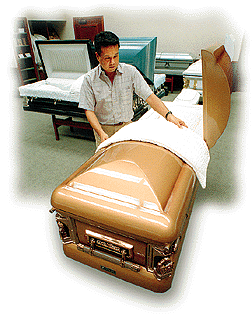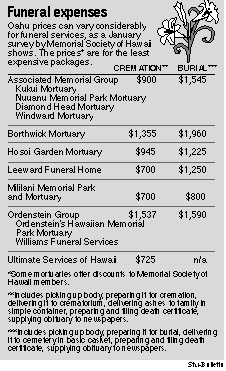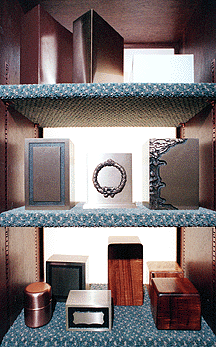
Michael A. Oh, funeral director at Mililani Park & Mortuary, shows a steel casket in the mortuary's showroom. Photo by Dean Sensui, Star-Bulletin

Michael A. Oh, funeral director at Mililani Park & Mortuary, shows a steel casket in the mortuary's showroom. Photo by Dean Sensui, Star-Bulletin
Financially.
When someone dies, survivors must come to grips with some hefty expenses. Depending on how elaborate a send-off the family wants, funeral and cemetery expenses can easily top $8,000. With a top-of-the-line coffin, the total could hit five digits.
But there's also a bare-bones way to say goodbye: immediate cremation with no services. That can be done for around $700.
 All of which underscores a basic point made by consumer groups: If someone dies without a prepaid funeral plan, it pays for survivors to shop around.
All of which underscores a basic point made by consumer groups: If someone dies without a prepaid funeral plan, it pays for survivors to shop around.
Just how much so is underscored by a Memorial Society of Hawaii survey taken in January.
The consumer education group found that the simpliest cremation packages on Oahu can range from $700 to $1,575. For the least-expensive burial package, the spread was similar: $800 to nearly $2,000.
It's not difficult to shop around, said John E. White, the society's executive director.
Mortuaries by law must quote prices over the phone and give out price lists at their offices.
Over the past decade, White said, those prices have been going up at a much faster clip than inflation - a contention the industry disputes - because mortuaries are free to charge whatever the market will bear.
"It's driven by profit and you've just got to beware," White said.
Waimanalo resident Ernie Aubrey agrees.
She helped arrange her father's funeral eight years ago, then went through the process again in March when her mother died. Aubrey and her husband also have purchased prepaid funeral plans, wanting to spare their children the stress and financial burden of making the arrangements.
Aubrey said mortuary personnel tried to get her to buy more than what she planned and budgeted for.
"They always want you to upgrade everything," she said. "They feed off the love you have for (the deceased) and want you to get nothing but the best."
Funeral executives dispute such a notion.
"I think that's an unwarranted criticism," said Ken Ordenstein, president of Ordenstein's Hawaiian Memorial Park Mortuary.
Funeral directors provide assistance in a professional manner and don't pressure survivors to spend beyond their means or wants, the mortuaries say. Also, sales people are paid by salary, not commission, so there is no incentive to boost sales, Ordenstein said.
A lot of the funeral decisions are made in Hawaii based on religious and ethnic factors.
Many Japanese families, for instance, opt for cremation, while Filipino families tend to prefer burial, the funeral directors say.
Economics also plays a role, contributing to a trend toward simpler, less costly funerals.
Some families decide on cremation simply because they can't afford a burial. That's one reason Hawaii has the highest cremation rate - about 60 percent of deaths - among the 50 states.
By the year 2000, that rate is projected to rise to 71 percent, according to the Cremation Association of North America.
Tips for lowering funeral expenses:
- Know precisely what you want and don't let a mortician sway you.
- Price shop by phone or in person.
- Make your own simple wooden casket.
- If shopping right after a death, take a friend who can help you keep to your budget.
- Plan a memorial service without the body there, saving on embalming, fancy casket or other expenses.
- Consider body donation to a medical school.
- Ask for a grave liner rather than coffin vault - what is used to house the casket.
- Join the Memorial Society of Hawaii ($12.50 one-time fee). Members can get discounts with some mortuaries.
Source: Funeral & Memorial Societies of America
Nationally, more than 7 million services have been arranged in advance, with $15 billion worth prepaid, according to the American Association of Retired Persons. Prepaying spares families from having to make decisions during times of stress and trauma, plus locks in prices no matter how much they go up in the future, funeral directors say.

A selection of urns.
"Funerals, unfortunately, aren't going to get less expensive," said Charles Wilson, vice president of mortuary operations at Mililani Park & Mortuary.Prepaid plans also spell out what the funeral arrangements will be, reducing the possibility of survivors arguing over such matters.
But there are risks.
You could get a better return investing the money elsewhere and setting up your own account to cover funeral expenses.
You also could lose money if you move and the prepaid amount isn't transferable or refundable, if the funeral home closes, or if the money is illegally siphoned off, consumer advocates say.
In Hawaii, the mortuaries are required to put 70 percent of the prepaid amount in a trust account as a consumer protection measure. The other 30 percent can be used to cover administrative costs.
Aubrey said she bought her plan so her children won't have to deal with the sticker shock she went through when setting up her parents' funerals.
"I wanted to die when I heard about the prices," she said. "It costs more to die than to be born."